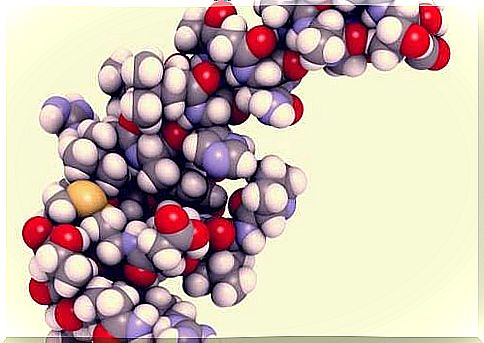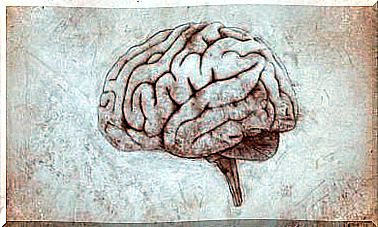Hypocretin: Characteristics And Functions

Hypocretin (also called orexin) is an exciting neuropeptide found in the posterior region of the hypothalamus. Among its functions it induces appetite, stimulate the state of wakefulness and attention and promote a positive mental attitude, among others. High levels of hypocretin cause sleep disturbances such as insomnia or narcolepsy.
Some habits may increase the presence of this hormone. For example, sunbathing, exercising, consuming foods that contain lactate, limiting glucose, and increasing fructose could stimulate the secretion of hypocretin.

What is hypocretin?
Hypocretin, also called orexin, is a neuropeptide discovered in the brains of mice by two researchers, according to Sakurai et al. (1998) and De Lecea et al. (1998). This hormone, whose original name derives from the English, hypocretin , was discovered in 1998.
It is a hormone made up of 30 amino acids. It is found in the hypothalamus, an area of the brain involved in physiological functions such as appetite, libido and sleep regulation.
Functions
Initially it was thought that orexin was involved only in the stimulation of food intake (therefore hunger). Central administration of this hormone, particularly orexin-A / hypocretin-1, was believed to increase food intake.
It was then found that hypocretin also regulates sleep, energy expenditure and wakefulness. It therefore performs various functions. Let’s see them in detail.
Supervisory state (attention)
The orexin promotes a state of alertness. Recent studies indicate that one of its relevant functions is to integrate the metabolic influences of the circadian rhythm and sleep deficit, influencing the states of sleep and wakefulness.
In particular, it would strongly excite various brain nuclei with important roles against insomnia (dopamine, acetylcholine, norepinephrine systems…). On the other hand, according to a study by Lin et al. (1999), an orexin / hypocretin receptor mutation causes sleep disturbances such as narcolepsy.
Appetite
Hypocretin also has the function of stimulating or increasing the desire for food, in short, hunger. In this sense, it interacts with substances that promote its production. Specifically, hypocretin stimulates hunger by localizing in the arcuate nucleus of the hypothalamus.
Some studies in guinea pigs show that low orexin levels cause obesity and even when few calories are consumed.
Relationship between hypocretin and Alzheimer’s disease
A study by Kang et al. (2009) links hypocretin to Alzheimer’s disease. According to this study, the production of beta-amyloid protein (a peptide that appears in Alzheimer’s disease) increases during the day and decreases in the evening and this is controlled by hypocretin.
It has been found that sleep deprivation could be the cause of the development of beta-amyloid plaques. The same study also suggests that regular sleep could prevent Alzheimer’s disease.
It affects the good mood
The orexin is not only related to physiological functions, but also to emotional ones. High levels of hypocretin promote a positive mood, as well as a feeling of happiness.
Anxiety and addictions
Low levels of hypocretin are believed to affect the desire to smoke and drink alcohol, especially in cases of addiction. Its presence has also been associated with brain reward mechanisms: an excess of hypocretin causes anxiety, which could lead the person to relapse into drug use.

How to stimulate the release of hypocretin?
Some actions or lifestyle habits can increase the presence of hypocretin in our body. These include:
- Sunbathing: Sunlight increases hypocretin levels.
- Play sports : The acidification of the blood that occurs during physical activity increases the excitability of hypocretin.
- Consume foods that contain lactate : lactate regulates hypocretin, increasing our energy.
- Limit glucose and increase fructose : High glucose levels can block the activity of orexin. Related to this, some foods that contain (healthy) glucose are: pasta, wholemeal bread, potatoes or legumes. Instead, foods rich in unhealthy glucose are: white bread, salty snacks, and fried foods, among others.
Orexin is a hormone related to multiple functions, both physiological and psychological. Many have dubbed it “the good mood hormone”, and in this sense it has been associated with a positive mood.
It is responsible for regulating emotions, mood and sleep / wake cycles and is also linked to learning processes. Finally, altered levels of this hormone are related to sleep disturbances, obesity and even Alzheimer’s disease.









